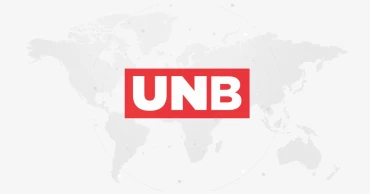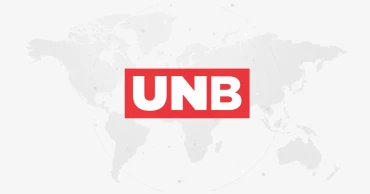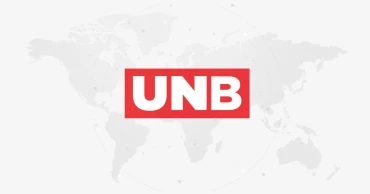Toby Cadman
Cadman warns against rushing cases before ICT, seeks further changes to legal framework
Addressing the complexities of the cases before the International Crimes Tribunal, Special Adviser to the Chief Prosecutor Toby Cadman on Monday warned the intricacies involved leave no scope for expediting justice.
"These cases are intricate and require time," Cadman said, during a press briefing at the ICT premises, after participating in the legal proceedings of the tribunal for the first time today. "There is no room for rushing to ensure due process is followed.”
While expressing confidence in Chief Prosecutor Tajul Islam's leadership and commitment to ensuring justice, he also mentioned plans to engage with legal professionals and the government to bring about further changes to the tribunal's legal framework. These changes, he said, would be necessary to enhance the tribunal's impartiality and align its proceedings with both domestic and international standards.
Shooting from helicopter: ICT issues arrest warrant against ex-RAB DG
Cadman, a British lawyer and co-founder of London-based law firm the Guernica37 Group, was appointed Special Adviser to the Chief Prosecutor of the ICT on November 20.
Previously, he had sought to represent some of the leaders of the Jamaat e Islami who were tried in the same tribunal under the Awami League, but was prevented from doing so by the AL government. He, however, dismissed concerns that events of the past could influence his professional conduct in the cases going forward.
Cadman also expressed his hope that India would extradite Sheikh Hasina to Bangladesh in the interest of justice and a fair trial.
“The Foreign Ministry has rightly urged India to extradite her. It is now up to India to decide whether they will stand for justice or shield her from trial. I hope they will support justice in the future,” Cadman said.
ACC finds foreign currency, gold, FDR documents in Sur’s lockers
Cadman emphasised that while the Bangladesh government cannot compel India to act on the extradition request, there is hope that she will be brought back, provided the requisite security and given every opportunity to defend herself under the law.
The International Crimes (Tribunals) Act, under which the ICT operates, was amended by an ordinance in November to allow for the prosecution of members of the army, navy, air force, police, Rapid Action Battalion, Border Guard Bangladesh and all intelligence agencies, among other changes.
Arrest warrants issued
In other developments, the tribunal issued arrest warrants against eight individuals, including six police officers and two Awami League leaders, in connection with cases centring the July-August massacre.
ACC to investigate officials involved in 2018 Nat’l Election ‘manipulation’
Chief Prosecutor Md Tajul Islam said that the warrants were issued based on evidence of direct involvement in sensational murders in Dhaka. “The investigation agency sought the warrants only after confirming their involvement,” Tajul said.
To prevent the accused from fleeing, their identities have not been disclosed. Separate petitions were filed for the arrest warrants against the eight individuals, Tajul added.
1 year ago
Toby Cadman hopes India will extradite Hasina
Toby Cadman, a UK lawyer and adviser to the Special Prosecutor of the International Crimes Tribunal (ICT), has hoped that India would extradite ex-prime minister Sheikh Hasina showing respect to the judicial system of Bangladesh.
“India is a democratic country and they are respectful to law. So, if Sheikh Hasina is convicted, India will send Sheikh Hasina back to the country respecting the judicial system of Bangladesh,” he said while talking to reporters after a meeting with the Chief Prosecutor Tajul Islam and officials of the investigating team of ICT.
He said since there is a relation between Bangladesh and India he doesn’t want to give any advance reaction on what decision India will take regarding Hasina.
Cadman said there should be no political interference in the work of the prosecutor team with whom he is working.
Tribunal publishes verdict on removal of Hasina's hate speech online
He said he had consultation with the United Nations, the UK Government, the US Government and the European Union who were fully supportive of him. “They are hopeful that the rule of law will be restored in Bangladesh through this trial.”
“As a British lawyer, my only work is to assist the prosecutors’ team so that the trial is conducted maintaining international standard and transparent process. Whether the accused (Sheikh Hasina) will be sentenced to death or released is the matter of the court,” he said.
Responding to another question, whether there is any scope to take the case to the International Criminal Court, Toby said, "First of all, Bangladesh is a member of the International Criminal Court. If Bangladesh fails and expresses its inability to conduct this trial for any reason, then the International Criminal Court has jurisdiction, it can conduct the trial on its own. The way it is being done with Putin and Netanyahu. However, the International Criminal Court is not the solution to all problems.”
ICT bans dissemination of Hasina’s inflammatory remarks in media
“I want to tell the people of Bangladesh that you will have to have patience over this trial so that the prosecutor team and the investigation agency can conduct the trial process well. This time the trial process is very important,” he said.
Cadman visited Bangladesh after the fall of the Awami League-led government through a mass uprising and he met the Chief Adviser Dr. Yunus on September 2.
1 year ago
Rights experts decry advocacy of Jamaat’s British legal adviser to impose sanctions
A number of Bangladesh’s leading rights activists decried the advocacy by British lawyer Toby Cadman – who was engaged by Bangladesh Jamaat-e-Islami as its legal advisor in 2011 – to impose sanctions.
The admission of Toby Cadman, as reported by Al Jazeera on December 6, 2022, points to yet another plot “to mislead the world on Bangladesh on the human rights issue” through lobbyists, they added.
Read: Toby Cadman, who was Jamaat's legal advisor, tells Al Jazeera he was part of team asking US, UK govts for Rab sanction
Cadman admitted to Al Jazeera to his efforts to get the UK to impose sanctions against Bangladesh’s law enforcement officials and expressed disappointment that it did not work out.
“I filed the request for sanctions and whilst I am not in a position to discuss the substance, I can confirm that I discussed the request with the Foreign, Commonwealth & Development Office (FCDO),” Cadman was quoted as saying, referring to the UK Foreign Office.
Bangladesh Jamaat-e-Islami engaged Toby Cadman as its legal advisor in London in 2011, after the trials of several top Jamaat leaders started – over war crimes committed during the 1971 Liberation War.
Advocate Rana Dasgupta, general secretary of Bangladesh Hindu Buddhist Christian Oikya Parishad, commented that after four decades of wait “the current troublesome situation, as regards to Cadman’s requests for sanction, points to a larger conspiracy overseas by Jamaat against the Sheikh Hasina-led government.”
Referring to huge public support behind the trials of war criminals, as materialised by the Awami League government, Dasgupta, who leads the country’s largest minority rights platform, said, “Top war criminals, who were brought to justice, belonged to Jamaat and the trial, that offered some solace for millions of victim families who lost their loves ones during the violent war crimes campaign, surely upset that entire cabal. The desperate group hired lobbyists in powerful countries to unsettle the Sheikh Hasina-led government so that these war criminals can evade justice.”
Read: Can a British legal adviser for Jamaat be considered an ‘independent voice’ for human rights?
“Since the beginning of the trials, Jamaat waged a wave of conspiracy including hiring lobbyists overseas to run a disinformation campaign to defend these war criminals overseas. Among a series of such campaigns, Cadman’s move for sanction is another pointer,” he added.
Dr Mizanur Rahman, Professor of Law at the University of Dhaka and former chairman of the National Human Rights Commission of Bangladesh, said, “Since the war crimes trial started, Jamaat appointed Cadman in London, and he scoured to serve the interests of his client. Thus, began smear campaigns against the war crimes trial. In doing so, this group saw Bangladesh as its enemy and the recent appeal for sanction by such a lobbyist clearly demonstrates that their objective has little to do with rights issues.”
Days after Cadman’s admission, Jamaat announced to launch a new movement with demands including ousting the Sheikh Hasina-led government, in sync with Bangladesh Nationalist party.
3 years ago
Can a British legal adviser for Jamaat be considered an ‘independent voice’ for human rights?
In a report published on December 6, 2022, Toby Cadman – a UK lawyer who was part of the team that asked the US and UK governments for sanctions against Bangladesh’s Rapid Action Battalion (Rab) – told Al Jazeera that everyone involved was surprised when UK decided not to implement sanctions.
After war crimes trials of its senior leaders began, Bangladesh Jamaat-e-Islami hired Toby Cadman as its legal counsel in London in 2011.
Read more: Toby Cadman, who was Jamaat's legal advisor, tells Al Jazeera he was part of team asking US, UK govts for Rab sanction
At the time, Tajul Islam, the legal representative for five Jamaat leaders, notified the media that Steven Kay QC, Toby Cadman, and John Cammegh had consented to represent the Jamaat leaders.
Al Jazeera, in its report, quoted Cadman as saying, “I filed the request for sanctions and whilst I am not in a position to discuss the substance, I can confirm that I discussed the request with the Foreign, Commonwealth & Development Office [FCDO, UK].”
He added, “Having worked on both the US and UK request for sanctions, I was strongly of the view that a coordinated response was necessary in the circumstances… Our filing in the UK targeted political officials and those in the security sector…. It was certainly my position that the UK would issue mirror sanctions in coordination with the US. I was extremely disappointed when they failed to do so.”
The question that arises here then, is: Under what circumstances can a legal adviser, hired to represent a certain party, be considered “an independent voice” for human rights?
Can a lawyer be “independent”, if he cannot go against the interests of his clients?
Further question arises as to how some media outlets can continue to project Cadman as “an independent voice”.
Read more: US sanctions on RAB made BNP fearless in anti-government protests: Fakhrul
It should also be noted that BNP Secretary General Mirza Fakhrul Islam Alamgir, in an interview published last month, had said the US sanctions on Rab helped rejuvenate the BNP rank and file to take to the streets fearlessly, something reflected in its recent rallies.
The detailed admission by Cadman, coupled with Fakhrul’s comment on US sanctions being a morale booster for them, makes the much-touted narrative that the sanctions were slapped on Rab solely because of serious violations of human rights look questionable. Considering these latest developments and revelations, there seem to be regime change intentions at play.
Moreover, a recent video of a Labour Party MP, in UK Parliament, asking the UK FCDO minister for Indo-Pacific why the UK did not go ahead with the sanctions at the last minute, makes the intentions more palpable.
(The writer is a Professor at the Department of Public Administration, University of Rajshahi. Views expressed are his own.)
3 years ago
Toby Cadman, who was Jamaat's legal advisor, tells Al Jazeera he was part of team asking US, UK govts for Rab sanction
Toby Cadman, a UK lawyer who was part of the team that asked the US and UK governments for sanctions against Bangladesh’s Rapid Action Battalion (Rab), has told Al Jazeera that everyone involved was surprised when UK decided not to implement sanctions.
In a report published on December 6, 2022, Al Jazeera made the revelation.
Read more: ‘Why this US sanction on Rab?’
Incidentally, Bangladesh Jamaat-e-Islami engaged Toby Cadman as its legal advisor in London in 2011, after the trials of several top Jamaat leaders started – over war crimes committed during the 1971 Liberation War.
The media was informed at the time by Tajul Islam – attorney for five Jamaat leaders – that Steven Kay QC, Toby Cadman, and John Cammegh had agreed to represent the Jamaat leaders.
Cadman was quoted by Al Jazeera as saying, “I filed the request for sanctions and whilst I am not in a position to discuss the substance, I can confirm that I discussed the request with the Foreign, Commonwealth & Development Office [FCDO, UK].”
“Having worked on both the US and UK request for sanctions, I was strongly of the view that a coordinated response was necessary in the circumstances… Our filing in the UK targeted political officials and those in the security sector,” Cadman said.
He went on to say: “It was certainly my position that the UK would issue mirror sanctions in coordination with the US. I was extremely disappointed when they failed to do so.”
Mohammad Ashrafuzzaman, a liaison officer at the Asian Human Rights Commission who submitted the proof of human rights violations by Rab attached to the sanctions petitions to the US and the UK, echoed Cadman’s dismay, according to the Al Jazeera report.
Read more: US imposes sanctions on RAB, 7 individuals
Ashrafuzzaman pointed out that the US utilised the evidence his team gathered to justify the sanctions against Rab.
Ashrafuzzaman told Al Jazeera: “The evidence was sent to the US state department and treasury, it was used by the US. That evidence was sent to the UK as well.”
Asian Human Rights Commission, in a statement released in October, alleged that “the pro-government media and the internal and external allies of the Government of Bangladesh are running a smear campaign against the UN Independent Experts, specially the Working Group on Enforced or Involuntary Disappearances (WGEID) for their consistent attention to address the issue of enforced disappearance.”
Responding to that, Professor Dr Mizanur Rahman, former Chairman of National Human Rights Commission, wrote: “What the (Asian Human Rights) Commission, however, failed to consider is that it was not an attempt to vilify any human rights body, rather the intention was to simply pinpoint the inconsistency and inaccuracy of the data coming from an institution like the UN which has always been at the forefront of defending human rights across the globe.”
Read more: US sanctions on RAB made BNP fearless in anti-government protests: Fakhrul
BNP Secretary General Mirza Fakhrul Islam Alamgir, in an interview published last month, had said the US sanctions on Rab helped rejuvenate the BNP rank and file to take to the streets fearlessly, as reflected in its recent rallies.
3 years ago









